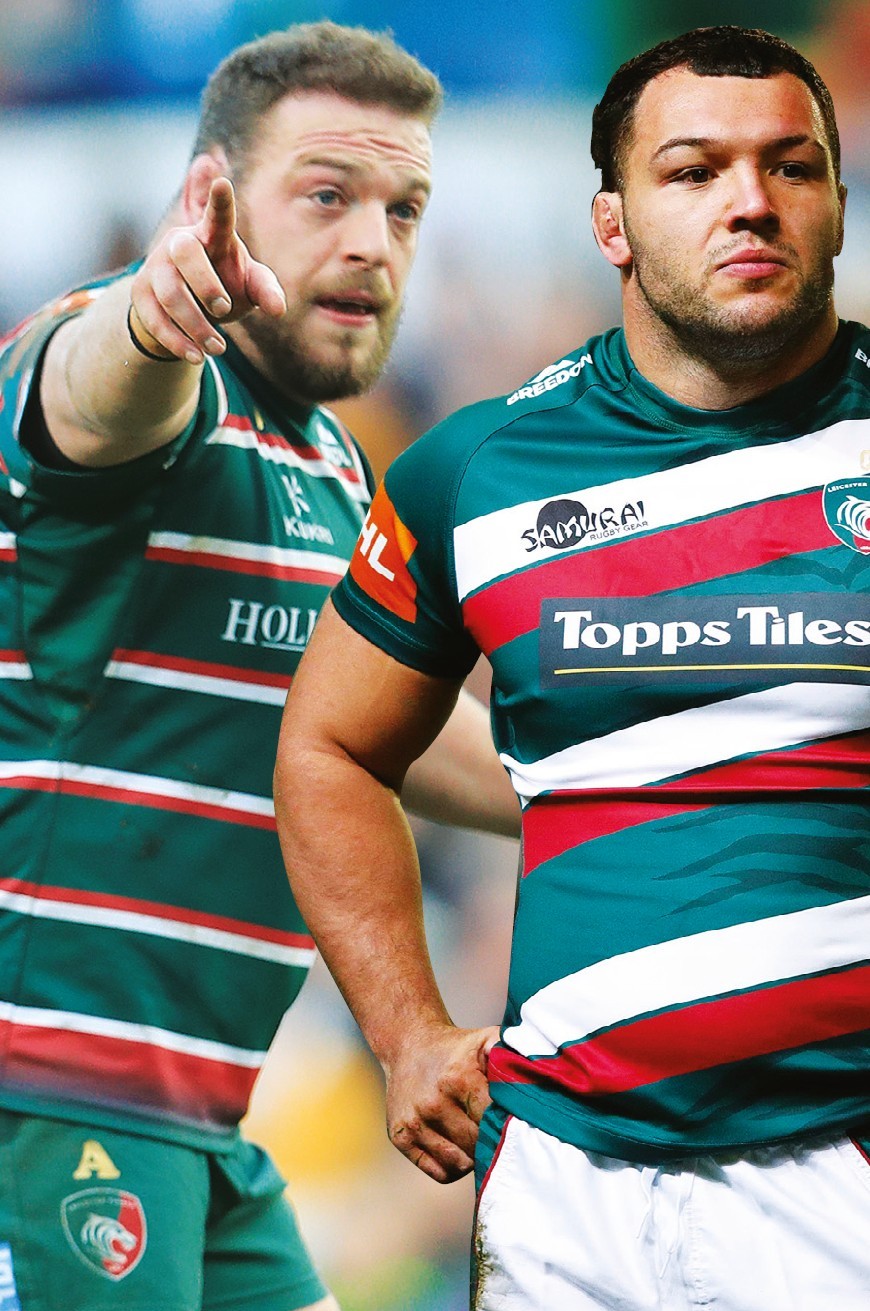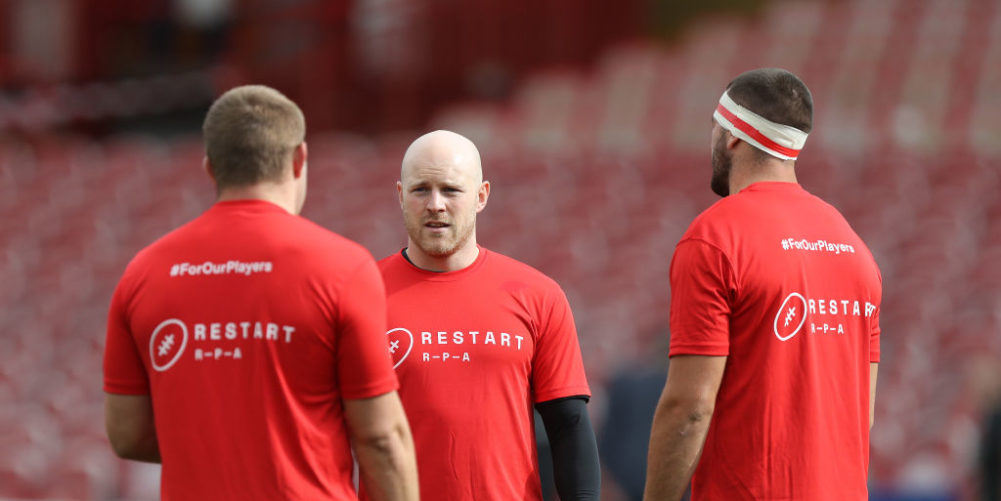At the end of a traumatic year, Rugby Players Association chief executive Damian Hopley defends his organisation and tells NEALE HARVEY why he remains staunchly committed to developing the ‘best rugby environment in the world' on behalf of his membership.
You founded the RPA 22 years ago, but have you ever known a year like this?
To say it's been extraordinary would be an understatement. When the initial challenges of Covid-19 appeared, I don't think anyone realised the global impact it would have. We all felt it would be under control by the summer and back to normal by autumn, but the scale of what we've seen and the trauma it's caused is incredible. Our challenge as an organisation has been around how quickly we've responded and I'm very proud in how we reacted in giving advice to over 700 players. We've had around 150 additional legal cases to deal with so we've never been busier and it underlines the need for a robust and well serviced players' association.
What lessons have been learned from the dramatic player wage cuts in May and June?
That we all – players, clubs, Premiership Rugby and the RFU – have to work together and we cannot work in isolation. If we do that and it becomes ‘divide and conquer' it just creates all sorts of uncertainty and unrest. There are some clubs who wouldn't change a thing and others who definitely would, but it's no surprise that the clubs that acted quickly and effectively continued the success they had. When you look at how the Exeters and Bristols behaved – and there were others – the necessity for transparency was paramount and we learned valuable lessons. The reality is that players were faced with a very serious situation where they may have been out of work because clubs could have gone bust, but by and large the players' approach was very mature because they realised there needed to be checks and balances with salaries if the industry was going to survive. We were thrust into a panic situation but we all tried incredibly hard to furnish as many players as possible with all the facts so they could make informed decisions. Some players took 25 per cent pay cuts, others took less, but, ultimately, we were able to navigate a way through it.
Have relationships between the RPA and some clubs been soured as a result?
There were some pretty fraught discussions and shouting matches on occasions. It was robust, there's no doubt about it, and quite rightly so because we had to protect the people we represent and clubs have to protect themselves. Subsequent to that, we've had clear conversations on how we want club and player relationships to work going forward so in many ways there have been a lot of positives to come out of this terrible situation. The track record of collaboration between club, player, Premiership Rugby (PRL) and the RFU is strong and you only have to look at other territories and see how relationships have played out there to see how well we've worked together.
How do you react to suggestions that you, the RPA, are in the pockets of PRL and the RFU?
I would 100 per cent dispute that and there's been a lot of nonsense written and spoken about us being compromised and how the RPA's means of funding means we go into negotiations with one hand tied behind our backs. Let's be clear about this, every players' association in the world is funded by the sport within which it operates, whether it's the PFA in football through TV rights, the PCA in cricket, Aussie Rules, NFL or wherever. One thing we've made clear with a number of players is that we always have the integrity of representing them to the best of our ability at heart – and that doesn't mean we're going to roll over at PRL's or the RFU's bidding. The fact of the matter is we have some of the best paid players in the world here and it's galling when we get accused of all sorts of stuff. Maybe we need to improve our education of what we do but we certainly feel that over the last year, and in the history of the RPA before that, we've had very positive and robust dialogue with all our stakeholders and we've helped create one of the best rugby environments in the world based on standard form contracts, insurance levels, improved termination clauses in con- tracts, rest periods in and out of season and welfare issues. It's demotivating for our team when we read negative stuff about us but we just have to address those issues and keep moving forward.
What did you make of the midsummer bid to create a new players' union, Rugby Players Epoch, which was fronted by Ellis Genge and Greg Bateman?
Greg was our player rep at the Tigers at the time and we had a number of conversations. He assured me that they didn't want to be a rival, it was more about creating a movement and financial investment, but it was a challenging time because he and Ellis had a good profile. What we've always said, though, is we'd rather work with people than against them and the appetite for what they were proposing wasn't overwhelming in the middle of the biggest global pandemic. We're not going to get into a public debate over that because that's in no one's best interests, but we've reached out to Greg and we'll keep a watching brief on it. In many ways it's good that players are taking an interest but we're better served by working together in the current environment rather than looking to set up different associations because that would undo a lot of good work that's gone on to date.
“We're better served by working together rather than looking to set up different associations”
Okay, but how can you convince sceptics that being funded by the RFU and PRL does not, by definition, compromise the RPA in negotiations over player rights and welfare?
All of our trade union negotiation activity is funded entirely by the players' subscriptions and our own commercial programmes. When I hear the stuff that we're getting money from PRL and the RFU so we can't fight our corner, it's just not true. Yes, 60 per cent of our revenue comes from PRL and the RFU but that money goes directly into our Gain Line development programme, insurance and education – and that's it, the traditional trade union stuff we fund ourselves. We look after 700 players within the 13 clubs who are members of PRL and the England men's and women's Sevens and 15s teams, plus the Restart programme. Restart is our charity and we have spent just shy of £400,000 on mental health programmes for players. We're incredibly proud of the work we've done there and the lives we've actually saved through that programme and we're always looking at ways in which we can better help players in future, whether its physically or mentally. There's a massive duty of care issue on behalf of the game to look at how we can find more postgame support for players in future, so of course we're working with PRL and the RFU on that to ensure we pick up the pieces for players. We deliberately work under the radar but maybe we need to trumpet ourselves a bit more because I know our 20-strong team have done a terrific job in a very challenging year.

On top of everything else, the dementia legal bombshell has now landed. Has it taken you by surprise or were you expecting it?
We knew it was in the air and we had some approaches during Covid, so it wasn't an almighty shock. The sadness about all this is that you've got 8-10 young men, with Kat Merchant from the women as well, who have got early onset dementia, so the interesting piece now is to see how all this plays out around proof of causation. But looking at rugby now to how it was when these guys were playing, it's almost night and day and we should be proud of the work we've done around match day doctors, injury assessment and creating a safer environment. Going forward, we believe many of the concussions occur within training environments, so in talking to the clubs and the RFU do we need to look at limiting the number of contact sessions in training, like the NFL does? How do you create fewer unnecessary head impacts and improve brain safety? Listening to Steve Thompson, Alix Popham and Michael Lipman, the human side of it is the worst and when you hear calls for regular brain scans, we must create a safer playing and training environment going forward.
Latest audit shows concussion up again at 22 per cent of all injuries. How concerned are you by this?
For eight years in a row now it's been the No.1 injury and there's a lot of talk around what we can do. Is it tackle height? Is it the laws? Is it refereeing? Should we have fewer substitutes? Is it contact in training? My entirely personal view is that we've got to address all of those areas and ensure the sum of the parts adds up to a safer game. Clearly, the tackle height sanction is a very live issue and it needs to be done in a co-ordinated manner across the world. There are a lot of initiatives, like the one in France where they're tackling waist-high with no double-tackles allowed, so it will be interesting to see what comes out of that.
Do you fear, as some commentators suggest, that rugby is facing an existential threat?
Personally, I don't. You hear calls to ban tackling in schools but that would be counter-productive and, as I just said, action is being taken on a number of levels. The challenge is how quickly those things can be rolled out without creating unintended consequences.
Where are we on the global calendar talks and creating a coherent season structure?
I've said from day one, when I founded the RPA, that you've got to get the season structure right because, as night follows day, if you do that financial success will follow. What we currently have is a patchwork of a season and it's hard for people to work out what the competitions are, where they should be in the calendar and who's playing whom and when. Whether it's at club or international level, you have to start with a competition structure that offers enough positives for clubs, provinces, unions, the Lions and World Rugby to say, ‘Okay, we can work with that and apply local nuances to it'. But there's so much self-interest that goes on inside the sport that it makes it virtually impossible to agree anything. I heard an expression recently that rugby will eventually eat itself – and it will be because myopia around selfinterest is causing huge challenges on a game-wide scale. If we could just have a season where clubs were deconflicted with the internationals so they could see their top players more often, you could have a really straightforward seasonal narrative. You've got to have player input, though, and it's like Field of Dreams – if you build it, they will come. Unfortunately, there are consultancy firms raking millions out of rugby but we're not getting much further forward. CVC has a big role to play now because they'll have stakes in the Premiership, PRO14 and Six Nations and want to maximise their investment in the game.
Self-interest within rugby is the biggest single block to progress but if CVC can bring things together and create a season structure everyone's happy with, that could trigger greater interest in the game globally.
How do you assess the growing influence of agents in rugby?
Agents play a crucial role but last year around £6m went out of English rugby in agents' fees, which is a concern. Agents have a responsibility to their players and in general their reputation is strong, but we do have to be wary because some players have their heads turned and that can lead to problems.
The better agents go beyond the contract and look at the lifestyle, support and education of the player so that it complements the work we do through our Gain Line programme and developing players for life after rugby.
Unfortunately, there are stories of poor agent behaviour and conflicts of interest because an agent doesn't want to upset a particular club, but the better agents are worth their weight in gold. What's important is that we regulate agents in a robust and rigorous manner to stamp out any malpractice.
How concerned are you that so many young players are not playing any rugby because of Covid?
When you look at the sheer number of quality players coming through, England are five and six-deep in some positions. There's never been a better group of players emerging in the Premiership, but the important thing is getting game time and that's a real problem at the moment. We have to look at the issue around Premiership Cup, A-League, Championship, dual-registration. We need a better playing programme for younger players.
What impact do you expect Nigel Melville, below, to have on rugby affairs at PRL?
Nigel was always a big supporter of the RPA when he was with the RFU and previously as a director of rugby at Wasps and Gloucester. I think he will bring a common-sense approach and he has a good rugby brain. Although it's an unenviable job he's got at the current time, there are brilliant people working in rugby and he'll benefit from the enthusiasm of owners like Chris Booy and Steve Lansdown (Bristol), Tony Rowe (Exeter) and Semore Kurdi (Newcastle). Nigel has the gravitas to manage all the challenges and he'll be well backed-up by Phil Winstanley, who has been nothing less than heroic in the way he's led PRL's operational issues around its restart and Covid. Having Nigel within that organisation can only strengthen it.
Finally, has the criticism aimed at the RPA diminished your enthusiasm for the fight and, if not, what does 2021 hold?
It's been a challenge and when you get personal attacks which are unfounded, it's difficult to take. There have been some dark forces at work but our enthusiasm as a team is greater now because we see this as an opportunity to deliver more and more on behalf of the players and for them to realise the value they get from the Association. When you stop playing you can just fall off the radar so we want to look at former player support in conjunction with the clubs and RFU. I'd be lying if I said I didn't find some of the criticism galling, but there's a lot to look forward to in 2021.



























